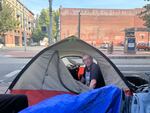Editor’s note: This is part of a package of stories profiling the two candidates for Portland City Council in the Nov. 8 election, Commissioner Jo Ann Hardesty and challenger Rene Gonzalez. You can read their answers to questions about the biggest challenges facing Portland here and here.
On an early fall stroll through downtown Portland, Portland City Council candidate Rene Gonzalez sees a few things he approves of and a lot he does not.
There are signs the heart of the city is returning to full health after the pandemic. The line at Voodoo Doughnuts is long enough to dissuade anyone but tourists. Sounds of a marching band in Pioneer Square reverberate for blocks. Outdoor dining spots are filled with Portlanders enjoying the last gasp of summer.
But there are also unavoidable signs of a city veering off course. Tents are everywhere. A man sitting on a corner is intently stripping what appears to be copper from long coils of electrical wiring. Too many storefronts are vacant.
“We have to be direct about some of these challenges,” said Gonzalez, as he walked into Portland’s Old Town neighborhood. “And Portland has — is that person nude up there? … I mean, there’s a nude person walking down Burnside right as we speak.”

Portland City Council Candidate Rene Gonzalez in Portland's Woodlawn neighborhood with Campaign Manager Shah Smith
Rebecca Ellis / OPB
A shrieking woman, fully naked, passes by. She weaves dangerously in and out of a rush of cars heading onto the Burnside Bridge.
It’s this in-your-face dysfunction that has led many Portlanders to conclude that things in their city have gone awry. It’s also what has brought an unusually blunt, politically untested 48-year-old businessman pledging to push Portland’s politics back to the center within reach of a City Council seat.
“I think Portland went so far left that we see and feel that the future of our city’s at stake,” he said. “I don’t think Portland can continue to be a functioning city if it continues on the path it’s going.”
This November, Portland voters will choose between two candidates as far removed from each other as one could find in a Democrat-dominated city: incumbent Commissioner Jo Ann Hardesty, a longtime advocate for greater police accountability vying for a second term, and Gonzalez, a self-described centrist promising a crackdown on homelessness and crime.
Related: Portland Commissioner Jo Ann Hardesty did what she promised. Now she might lose her seat.
Gonzalez is running on a campaign platform that would have been unthinkable from a leading political candidate a few years ago when thousands of Portland protesters were demanding police budget cuts and facing off nightly against the city’s police force.
If elected, Gonzalez says he wants to hire hundreds more police officers. He wants to dramatically ramp up the number of arrests for low-level crimes. He wants to see the city’s entire homeless population in shelter. People living on the streets who refuse to enter a shelter should, he says, get a ticket and potentially, face jail time. He calls it “tough love.”
It’s a punitive approach more in line with the “tough-on-crime” policies of the 1990s, seemingly out of step with the politics of left-leaning cities like Portland. But Portlanders are fed up and, Gonzalez bets, willing to part with their ultra-progressive ideals in favor of someone promising them a clean and safe city.
“We all had to go through this, as a city, for this to be palatable politically,” he said. “I’m not sure I would’ve said these things two years ago. I’m not sure I felt these things two years ago.”
He started with schools
But times have changed.
Gonzalez arrived in Oregon in 1993, moving from his home in Anchorage, Alaska, to attend Salem’s Willamette University. He played varsity soccer all four years and served as president of Beta Theta Pi fraternity. Gonzalez, nicknamed “Nene” by his frat brothers, graduated uncertain if he wanted to attend law school or, perhaps, join the Peace Corps, according to his senior year yearbook.
He chose law school. He said he was inspired by his father, a migrant worker from the Texas border town of Weslaco, who went on to become a trial judge in Alaska. If he wins in November, Gonzalez would be the second person — and first man — of Latino descent elected to the City Council, though he has not mentioned the milestone and rarely talks publicly about his race. He has described himself as half-Latino.
Gonzalez stayed at Willamette for law school. He started his career at law firm Stoel Rives handling real estate, finance and corporate law before jumping to childcare company KinderCare where he would serve in various leadership roles including general counsel. Ten years ago, he started his own legal firm called Eastbank and later bought up a small Texas-based tech firm called Artifex Partners. His wife, Angie, who he met in college, works as the office manager for both companies.
Gonzalez said he never considered going into local politics until the fall of 2020, near the beginning of the pandemic. He was worried about the effect school shutdowns were having on Portland kids, including his own three children, who were in 8th and 2nd grade when schools shut down.
After commiserating online with other Portland-area parents, he coalesced a group called ED 300 of what he estimates were roughly 40,000 parents statewide to lobby Gov. Kate Brown to reopen school (other members guesstimate the number was around 30,000 people connected mostly on Facebook). The issue was deeply controversial, with many teachers warning school days could easily turn into super spreader events — especially in the period when Gonzalez began the group, months before a vaccine had been invented.
As part of its advocacy to reopen schools, the group endorsed a slate of school board candidates across the state last spring who said they were committed to reopening schools. Hardesty and some of the city’s progressive leaders have attacked Gonzalez for supporting “extreme candidates” through the endorsement process, pointing to similar candidate endorsements made by groups that had advocated against LGBTQ rights, such as the Oregon Family Council. Gonzalez has defended the endorsements, emphasizing the group was laser focused on candidates that would get kids into school and strove to be bipartisan.
While there was fierce opposition to schools reopening, there were also many Oregonians on both sides of the political spectrum who wanted kids back in class. Kim McGair, an attorney and founding member of ED 300, said Gonzalez showed a knack for bringing together people of opposing political views — honing in on common ground and avoiding anything likely to spark disagreement.
For ED 300, which brought together Republicans and Democrats at the height of the pandemic, that meant eschewing talk of the COVID vaccines once they were developed.
“Instead of saying, ‘Well this person is saying anti-vax things, let me tell you why that’s wrong and go off on a tangent,’ it’d be like ‘No, no, no, no we’re not even going to talk about that,’” she said.
Some of the parents from the group, Gonzalez said, were impressed enough by his steady leadership and calm demeanor that they asked him to consider a run for city council.
“It’s just plain language and common sense,” said McGair, of Gonzalez’s appeal.

Portland City Council candidate Rene Gonzalez at his election night party, May 17, 2022 in Portland, Ore.
Jonathan Levinson / OPB
Getting tougher on homelessness
That is one thing Gonzalez and Hardesty have in common: they say what they’re thinking.
When it comes to Portland’s problems, they just think about them very differently — particularly when it comes to the issues top of mind for voters: homelessness and crime. Poll after poll has shown voters are furious about the proliferation of tents and skyrocketing gun violence with a historic percentage of Portland convinced the city is headed in the wrong direction.
Hardesty has spent her time in office scrutinizing, criticizing and most recently suing the police. Gonzalez has said the city needs a “police department cheerleader.” Hardesty regularly opposes homeless sweeps, arguing it’s cruel to move people when there is nowhere else for them to go. Gonzalez says the city’s been too lenient for too long and believes homelessness needs to once again be criminalized.
And he is willing to get very, very specific about his path to get there.
A few blocks past the nude woman, Gonzalez stops on the corner of Northwest Davis Street and 6th Avenue. Tents line the blocks in front of him. To his left, a man washes sweat and grit from his face with splashes from a Benson Bubbler.
OPB asked Gonzalez to walk through, step by step, how he’d approach the six or so tents on this corner if he had the rest of the city council behind him.
The first question he asks: is there probable cause that anyone living on this street corner has committed a crime?
“There’s a certain percentage of these tents where there’s criminal activity going on, right? I don’t know if it’s one, I don’t know if it’s two. I feel very confident — whether sex trafficking, selling drugs, or someone involved in stealing bikes or stealing something else — there’s criminal activity going on in one of these tents that we’re looking at,” he said. “Those, we’re going to go after right away.”
Gonzalez said he wants to see police dramatically ramp up arrests, including for misdemeanor offenses such as shoplifting or trespassing.
“If you’re doing crimes in the city of Portland, I don’t care if you’re unsheltered, I don’t care if you’re an addict or suffer [from] mental illness,” he said, “you will start in the criminal justice system.”
Currently, according to statistics from the DA’s office, police refer a small fraction of the reports they receive on property crimes, such as robberies and thefts, for prosecution. Gonzalez says he believes one of the big reasons the Police Bureau is struggling to close cases is because the department is understaffed. He believes the city needs up to 400 more officers to effectively police Portland. The bureau currently has 790 sworn officers.
He also wants to start a municipal court, in which judges hired by the city would handle misdemeanor offenses. He said he’s not yet sure how exactly it would be funded.
Municipal courts, while common elsewhere, have proven controversial, with some jurisdictions relying on the fines and fees doled out by judges to generate revenue for city services. Outrage over abusive municipal court practices in Ferguson, Missouri, where people lost jobs and housing after being incarcerated for failing to pay fines for low-level offenses such as traffic tickets, helped fuel the city’s 2014 protests.
Gonzalez’s plan to tackle crime comes with a hefty price tag. Assuming each one of those new police officers comes in at the lowest salary range ($75,000), his goal of beefing up the bureau would cost the city $30 million in one year — and that’s not including benefits, overtime and training. Gonzalez acknowledges the city would also need to incentivize people to apply for these jobs; the bureau currently has 92 funded sworn officer positions it hasn’t been able to fill, according to numbers provided by a police spokesperson.
He says some back-of-the-napkin math puts the cost of a new municipal court at a “couple of million dollars” annually — though he said that doesn’t account for revenue generated from fines and fees collected by the court. It also doesn’t take into account whatever it will cost to jail additional people. Multnomah County’s Sheriff’s Office spends $266.38 per jail bed per night or $317.87 when you factor in medical services. With the county’s jails operating at roughly 78% capacity last month, it’s also possible new jails would need to be built down the road should the police start dramatically increasing the number of arrests.
All told, criminal justice experts say this would amount to a multi-million dollar reinvestment in the region’s criminal justice system at a time when many municipalities have tossed tough-on-crime policies as wrong-headed and expensive.
Put simply, criminal justice experts say, it won’t work and inevitably leads to mass incarceration and the over-policing of people of color. The United States has the highest incarceration rate in the world.
“We’ve gone through the 70s, 80s, and 90s. We’ve seen the governing through crime. We’ve seen this culture of fear that’s created around crime,” said Chris Campbell, an associate professor at Portland State University’s Department of Criminology & Criminal Justice. “And it doesn’t really work to reduce crime.”
Campbell, who said he has not endorsed nor publicly supported a candidate, said crime is still down significantly compared to the ‘90s and early 2000s, though there’s been an uptick in property crime in the last few years. Whenever cities see a rise in crime, Campbell said, it’s not unusual to see tough-on-crime candidates follow.
“As soon as you see any kind of uptick, the knee-jerk response is to say, ‘We need to get tough on crime,’” he said. “I can’t emphasize enough the fact that if you think crime suppression is the only way to reduce crime, you’re doomed for crime to maintain its current course.”
Gonzalez said he’s clear-eyed about the arguments made against his proposal. But, he argues, right now, ramping up prosecution of low-level crimes is the most humane option. He believes many of the crimes taking place are committed by people with severe addiction and mental health issues. A judge, he says, will be able to compel these people to get treatment.
“That’s how you disrupt certain cycles of criminality,” he said. “We don’t have a better way, in my opinion, to disrupt that cycle than to arrest that person for stealing someone’s catalytic converter [and] ideally, get them into diversion that mandates addiction services.”
Many of the people who come through Multnomah County Circuit Court are already ordered to receive drug and alcohol treatment as part of their punishment, said Rachel McCarthy, a public information analyst for Multnomah Circuit Court. What type of treatment they receive depends on the crime they have committed, whether it’s a first-time offense, and whether the crime was driven by drug, alcohol or mental health problems.
But, she said, mandated drug, alcohol, and mental health treatment is not a foolproof answer for the courts. Many people don’t or can’t comply with the treatment required by the judge — which can lead to jail time.
Campbell said evidence on mandated treatment through the courts is mixed. Some studies on drug courts say it’s an effective way to reduce drug use and recidivism, while other studies have found it’s not as impactful as persuading people to enter treatment voluntarily.
“Some people will likely respond well to court-mandated treatment, but there are likely many others who will not,” he wrote in an email. “We need to have more localized studies completed of the mandated treatment efforts here in Oregon and Washington to really know more.”

Rene Gonzalez, candidate for Portland City Council, 2022.
Courtesy of Patrick Prothe
Shelter or else?
If Gonzalez is elected and his policies came to fruition, some people currently living on the streets would likely end up in jail.
The rest, he hopes, would end up in shelter.
In Gonzalez’s ideal Portland, social workers would regularly walk through areas where there’s public camping to inform people living outdoors that they must go to shelter.
In order to do that, the region would need to have shelter beds to direct people to. Under the Ninth Circuit Court of Appeals’ Martin v. Boise decision, municipalities cannot outlaw sleeping outside unless there are available shelter beds.
“We’ve got to get to the point where we’re offering sufficient shelter, safe sleeping spaces with the end game that this has to end,” said Gonzalez.
Gonzalez says that to comply with the court’s requirements, he wants to see a massive expansion of safe shelter options in the city. This will be a Herculean — some say impossible — task. With an estimated homeless population of over 6,000 people and roughly 1,500 available shelter beds, Portland could need thousands more beds to check that box.
Gonzalez would not be alone on the council in his desire to quickly build shelters to fulfill the requirements laid out by the Martin v. Boise case. Mayor Ted Wheeler is expected to announce a plan this week to ban unsanctioned camping and create three 500-person campsites. The mayor’s change in strategy, which he is expected to lay out this week, was first reported by Willamette Week.
Gonzalez acknowledged that the city’s track record on shelter creation does not inspire confidence. Portland Commissioner Dan Ryan’s plan to build a series of Safe Rest Villages, six small outdoor homeless camps, has been beset with unexpected delays and angry neighbors. Project managers expect to have 325 beds when all shelters are open. So far, just one has opened with two more nearing completion.
More shelters also won’t change the fact that many people will decline to go. Some people living outdoors say they feel unsafe in shelters or don’t feel comfortable sleeping around so many strangers. Others may not want to part with their belongings or their pets.
Gonzalez says he wants to see the region build more varied types of shelter that could ease some of these concerns. But at a certain point, he says, people will have no choice but to go. If they don’t, he wants police to take away their tents and give them a violation.
“This is illegal under Portland law,” he said. “For folks that don’t want to abide by City of Portland rules, they do have to face the criminal justice system.”
Sending a clear message
This phrase — “face the criminal justice system” — is a favorite of Gonzalez’s. In a one-and-a-half hour walk through downtown, Gonzales repeated it eight times. He emphasizes that, for people whose only offense is sleeping on the streets, this would not necessarily mean jail. Under Portland City Code, camping is punishable by a fine of up to $100 or a jail sentence of up to 30 days.
He hopes enforcement will send a message: “Portland is not the place to just come and camp out.”
While Gonzalez says this policy wouldn’t necessarily mean any homeless people are punished beyond a fine, it’s not hard to see how the violations could snowball.
Take Jim Robinson, who camps in one of the clusters of tents Gonzalez pointed to on Northwest 6th and Davis.
OPB returned to speak with him a week after touring downtown with Gonzalez. Robinson, 52, has been homeless in Portland for six years and spent the last month on the street corner.
He said he was not interested in going to a shelter. There were too many people “stacked side by side,” he said, and he didn’t feel safe.

Jim Robinson has camped on Northwest 6th and Davis for one month. Robinson says he has $2.75 to his name and would not be able to afford a fine if living outside became a criminal offense in Portland.
Rebecca Ellis / OPB
If Gonzalez’s policies were enacted, that would mean police could potentially hand him a $100 fine and take away his tent. Robinson says he has $2.75 to his name.
He said he would find a way to buy a new tent. He would not pay the fine.
“You’re going to get blood from a turnip? Where’s the money going to come from to pay that fine?” he said. “They’ll spend more money on the paperwork than [they’ll] get back from the fine.”
In Multnomah County, if you don’t pay a court fine, the debt could be assigned to a collection agency, and, in some cases, a warrant could be issued for your arrest. Unpaid fines can also make it impossible for people to expunge their criminal records, a barrier to landing a job or housing. Advocates say this traps people in an endless cycle of poverty.
Gonzalez’s response: They’re already trapped.
“If we’re not intervening, they’re never leaving that cycle of poverty,” he said. “Where I’m going is we need to one: not enable some really destructive behaviors on the streets of Portland. And two: to get back and balance the social contract here. That’s my answer.”




